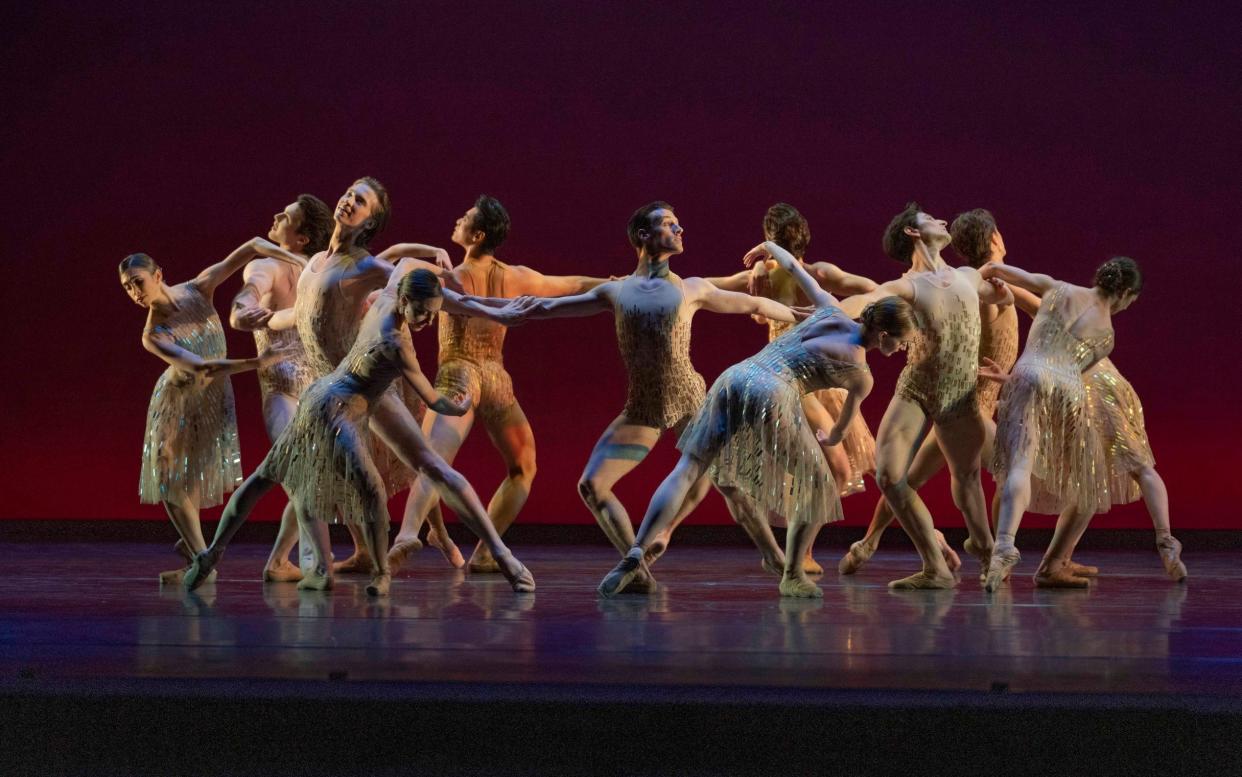21st-Century Choreographers, Royal Opera House, review: a balletic feast – with a ghost present

- Oops!Something went wrong.Please try again later.
The Royal Ballet was given a standing ovation last night before the curtain even rose. And who, frankly, can blame the dance-starved audience for demonstrating such noisy relief? It was Britain’s flagship ballet company’s first live performance in five months. True, the front of house remains barren: at 784, audience capacity is still barely one-third of the “peacetime” 2,256, and anything more substantial or alcoholic than an ice-cream is available only for those lucky or canny enough to have ordered beforehand.
But the show’s the thing, and this was the start of a 12-day run for a largely new mixed bill. Where the company’s first post-lockdown comeback, in October last year, was a collection of mostly familiar snippets, this programme was trying painfully hard to push the other way: bracing, icy rapids compared with that earlier comforting bath.
Admittedly, Christopher Wheeldon’s Within the Golden Hour did make for a lyrical, reassuring opening, even if the Royal Ballet didn’t emerge from the traps with quite the collective perkiness that ENB had mustered when they, too, returned, one day before. Created for San Francisco Ballet in 2008, this abstract seven-parter is up there with Wheeldon’s finest, most organic work, teeming with easy physical counterpoint and subtly smouldering and inventive pas de deux; here it proved a particularly delightful showcase for the company’s girls.
Then the evening’s mood, and indeed colour palette, became resolutely less golden, with the world premiere of a short, spikey pas de trois by the American choreographer Kyle Abraham (ahead of a more substantial new piece promised for next year). Optional Family: A Divertissement launched with two mordantly amusing, computerised voiceovers that expressed mutual spousal revulsion – an all-too-familiar lockdown phenomenon, you suspect.
And, to a score of machine-gunning electronica, it unveiled a couple in free fall, selfishly enthralled by a third, apparently “optional” member of this unit. Marcelino Sambé stole the show here for his quicksilver expressions of lust and loathing, though Natalia Osipova and Stanisłav Węgrzyn were both punchy too. The work’s unforgiving energy left you awaiting Abraham’s 2022 offering, if not quite with bated breath, then certainly with interest.

After the interval came two similarly downbeat pieces by Canadian wonder Crystal Pite, both of them created for Nederlands Dans Theater and new to the Royal Ballet. A four-hander, The Statement is a nightmarish demolition of boardroom politics. Cue very Piteian voiceovers, as inane and relentless as anything in Ionesco’s plays, which the four dancers acted out with preternatural speed and agility, more flesh-and-blood animations than humans. Full marks to all.
Then, inspired by the poem Lines for Winter by Mark Strand, Solo Echo played out to a backdrop of falling snow; set to a melancholy Brahms cello sonata, it read like a bleakly optimistic testament to the power of others’ support. There was much to admire in the tender poetry of Pite’s choreography, and the septet, which included newly-promoted principal Cesar Corrales, dived passionately in.
But, where I started the evening so grateful to see these dancers back that I could have leapt on to the stage and hugged them, I made for the exit sombrely. This is a company still in shock after the presumed suicide of its former artist in residence Liam Scarlett only last month. Just 35, he was, after all, a “21st-century choreographer” himself, almost all of whose work has been struck from the company’s rep following his departure in March 2020, in the wake of allegations of sexual impropriety with students at the Royal Ballet School.
It is a profoundly tragic and sorry affair, made still more so by the many mysteries that both institutions continue to allow to surround it. The dolefulness of the evening had a certain resonance in the wake of that event, and the other hardships of the past 14 months, but is it really what an audience wants at this point? The closing “ovation” was respectful and affectionate – and rightly so – but it was far from rapturous, and very much seated.
In rep until May 30. Tickets: 020 7304 4000; roh.org.uk

